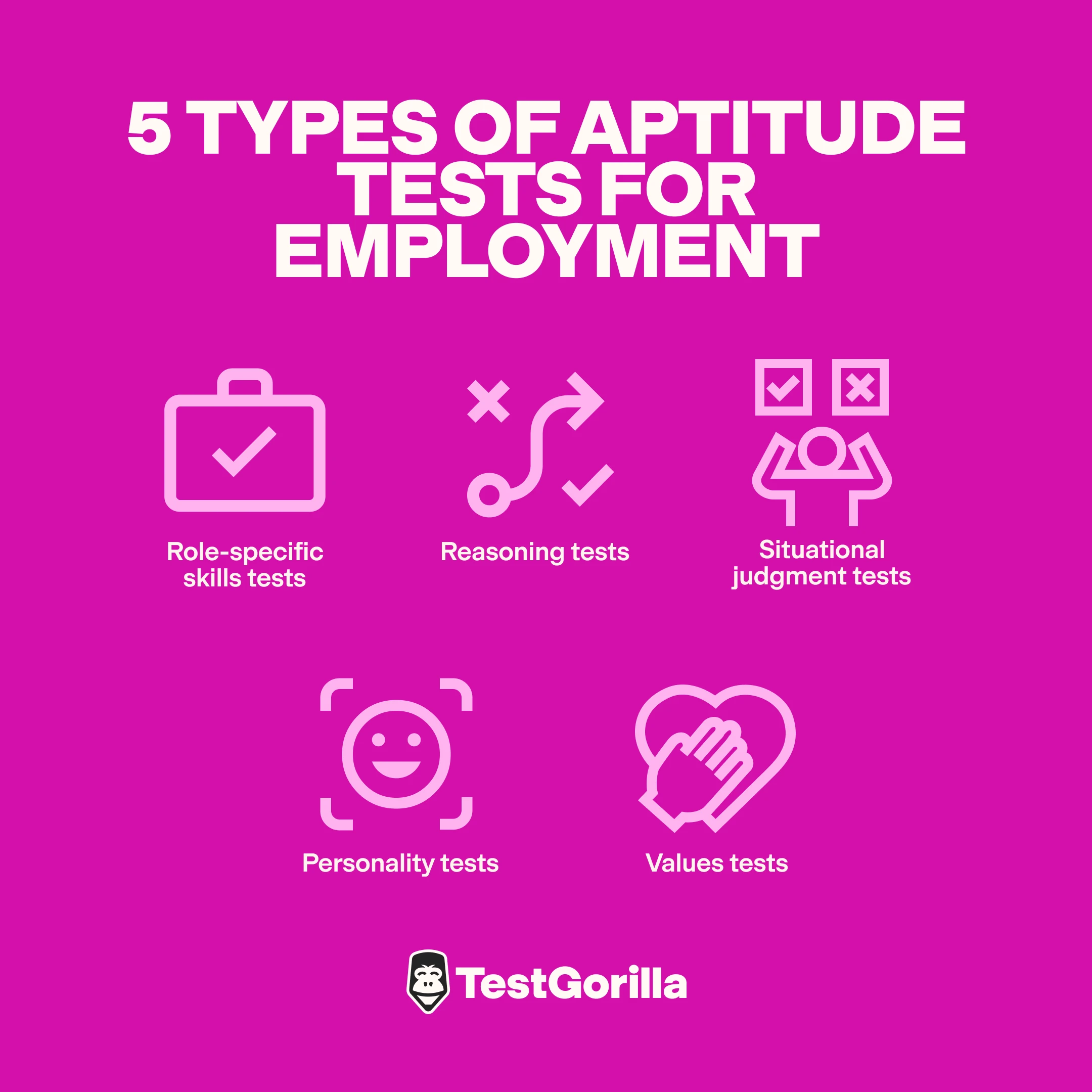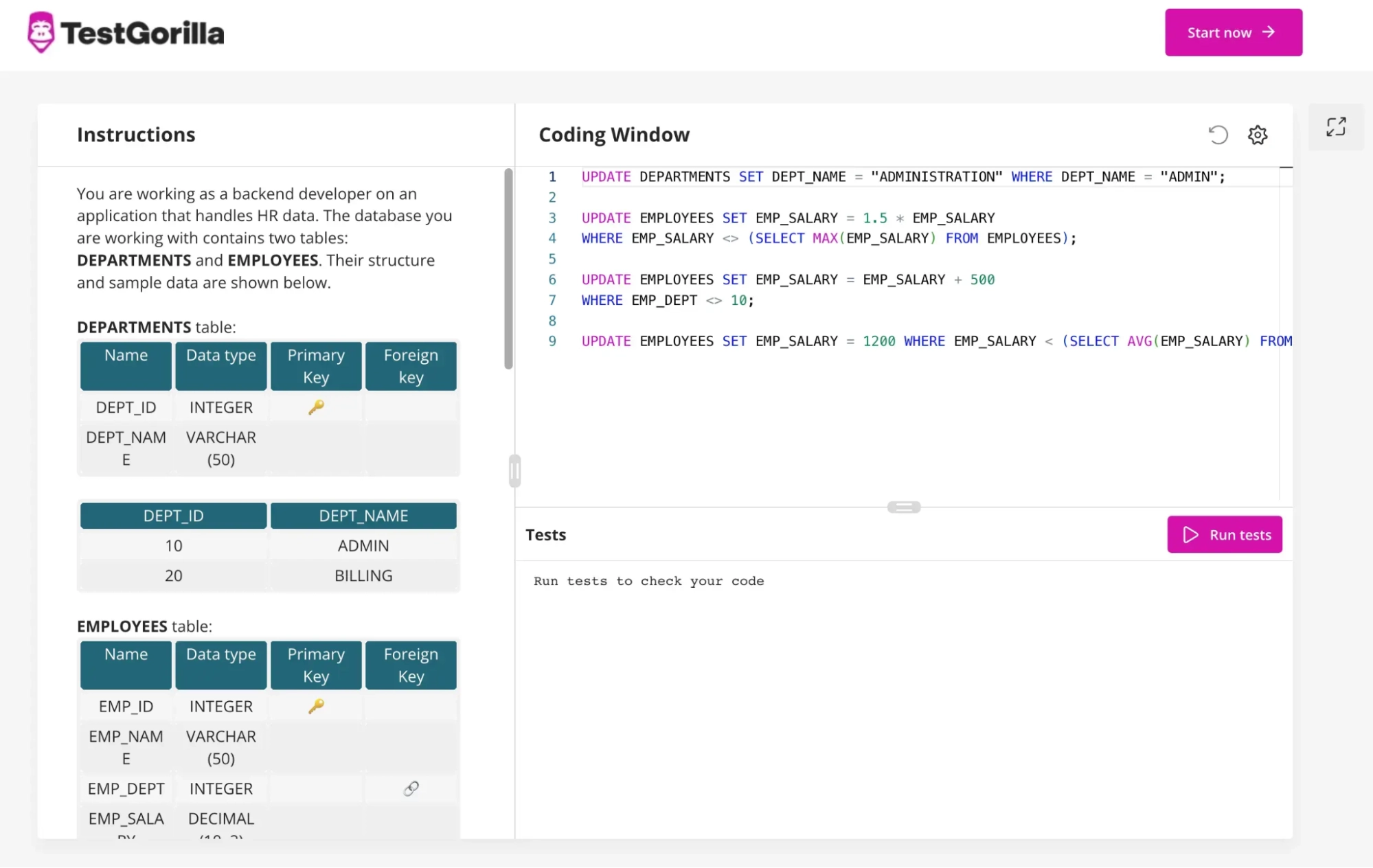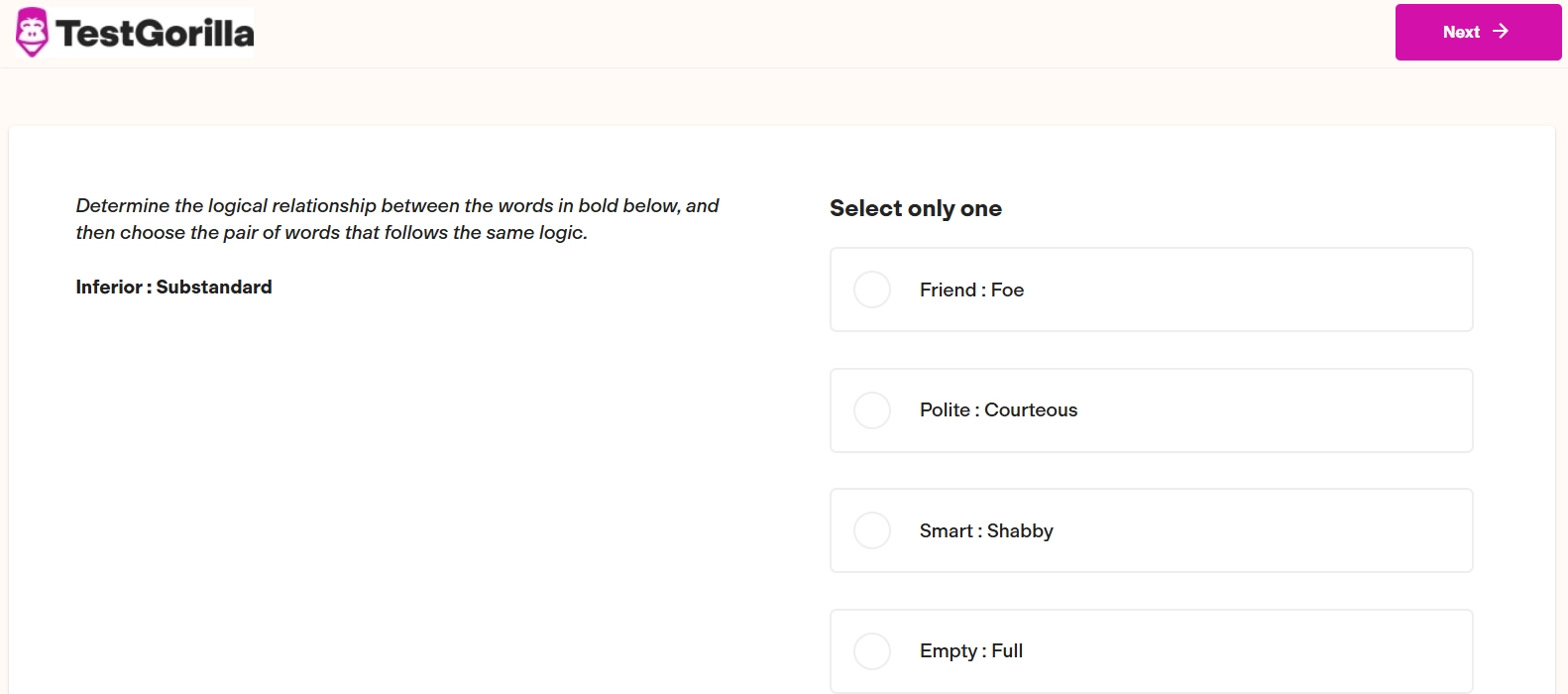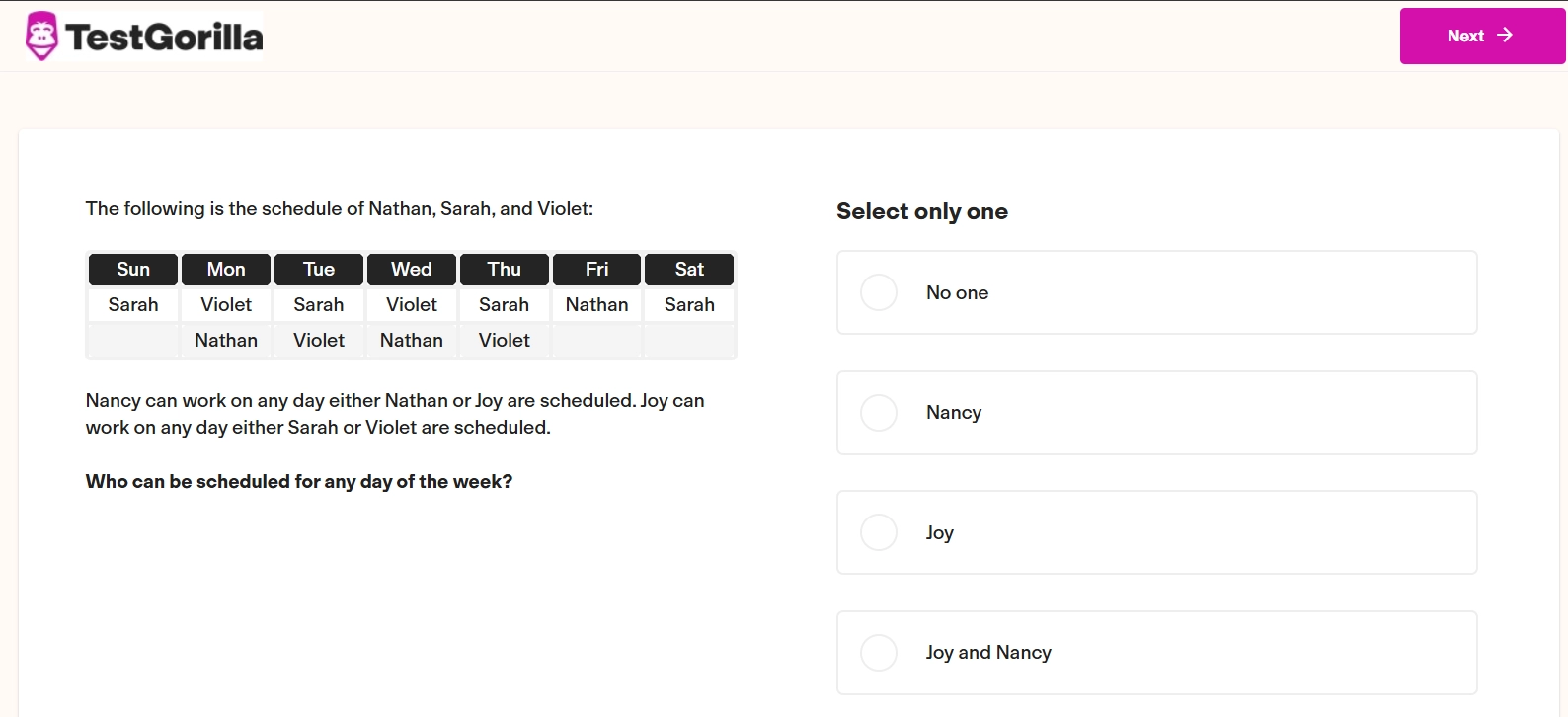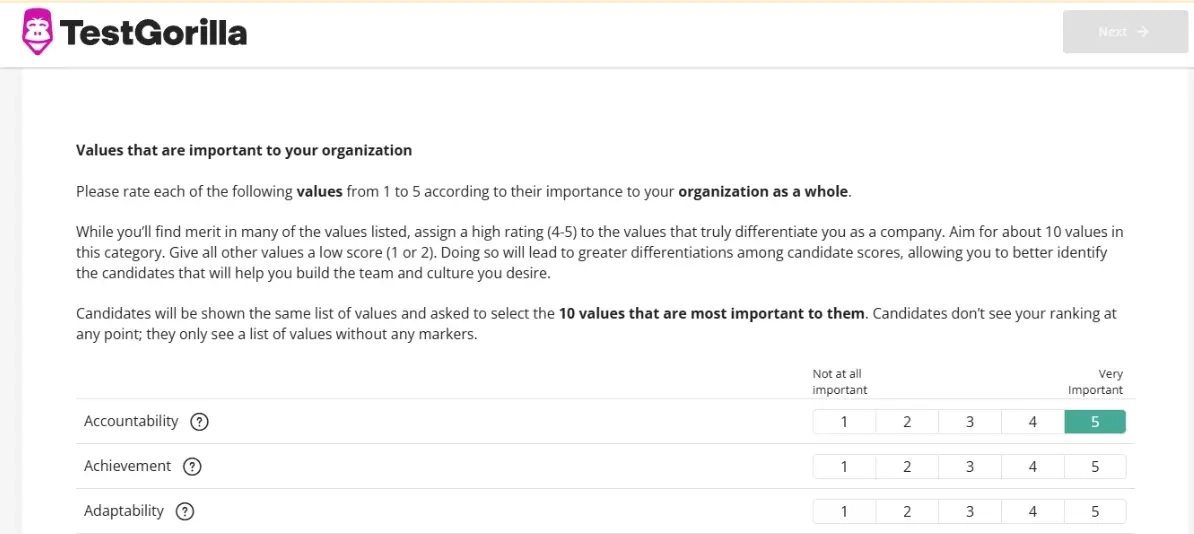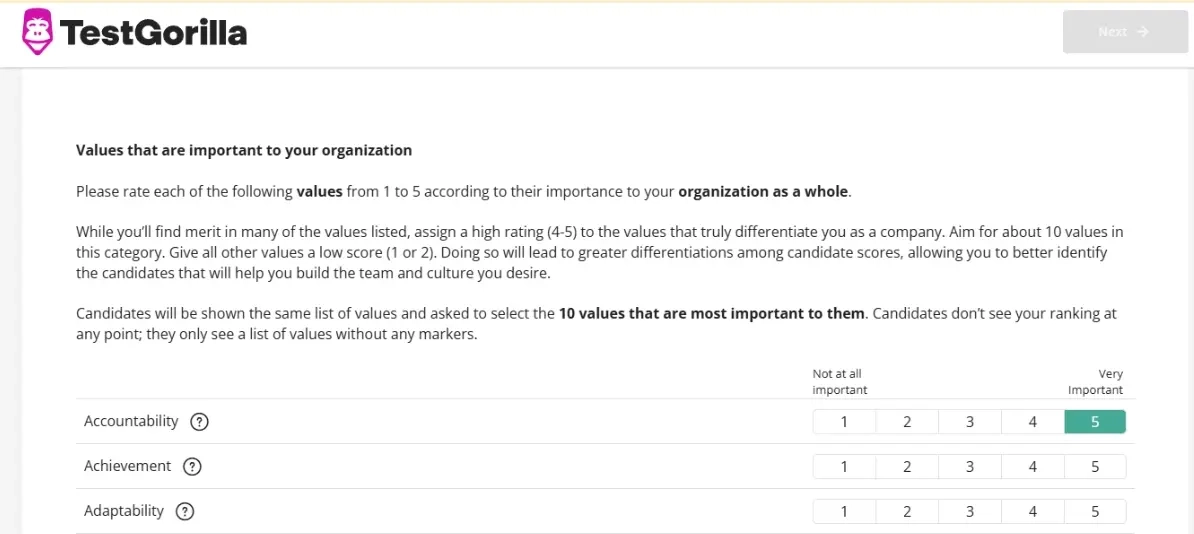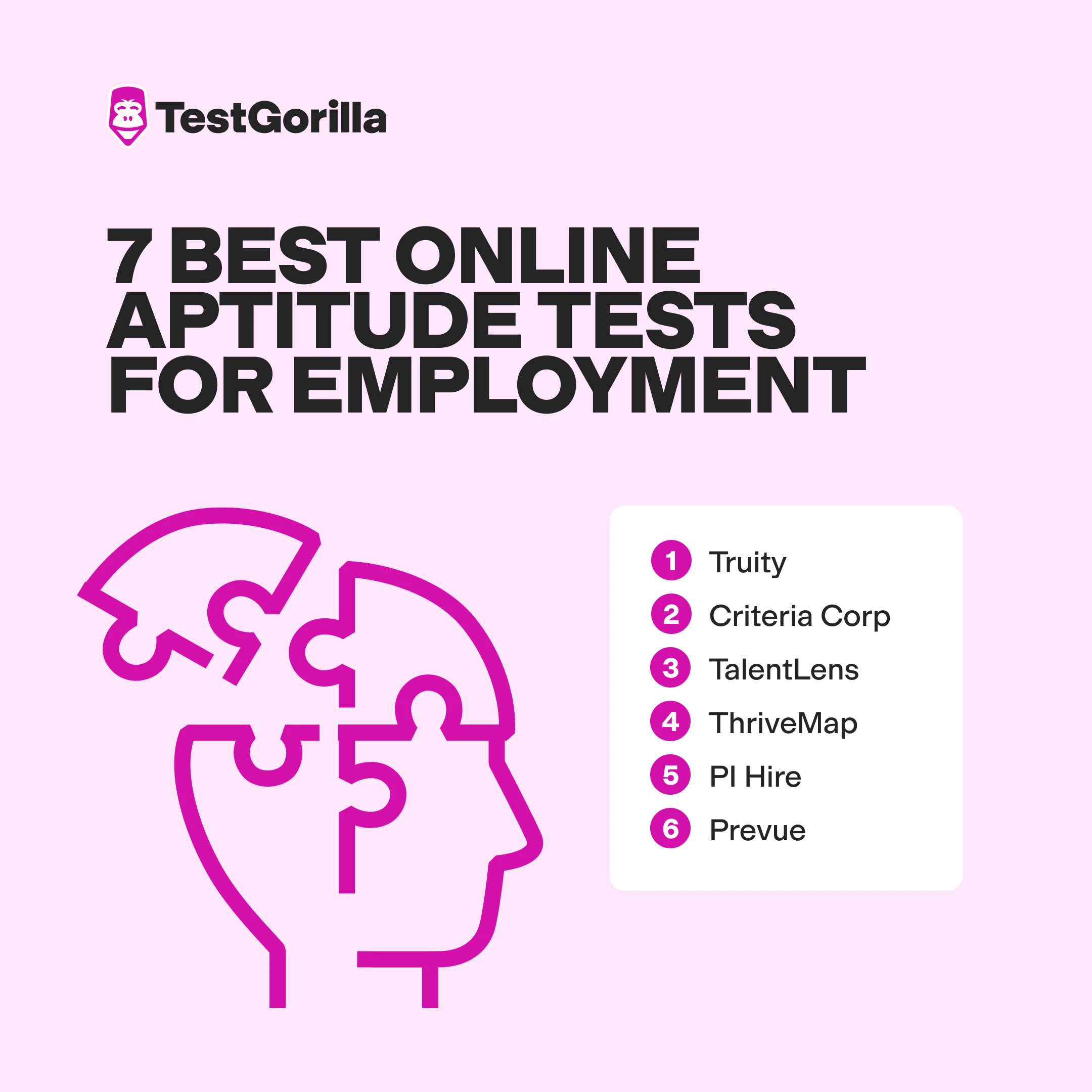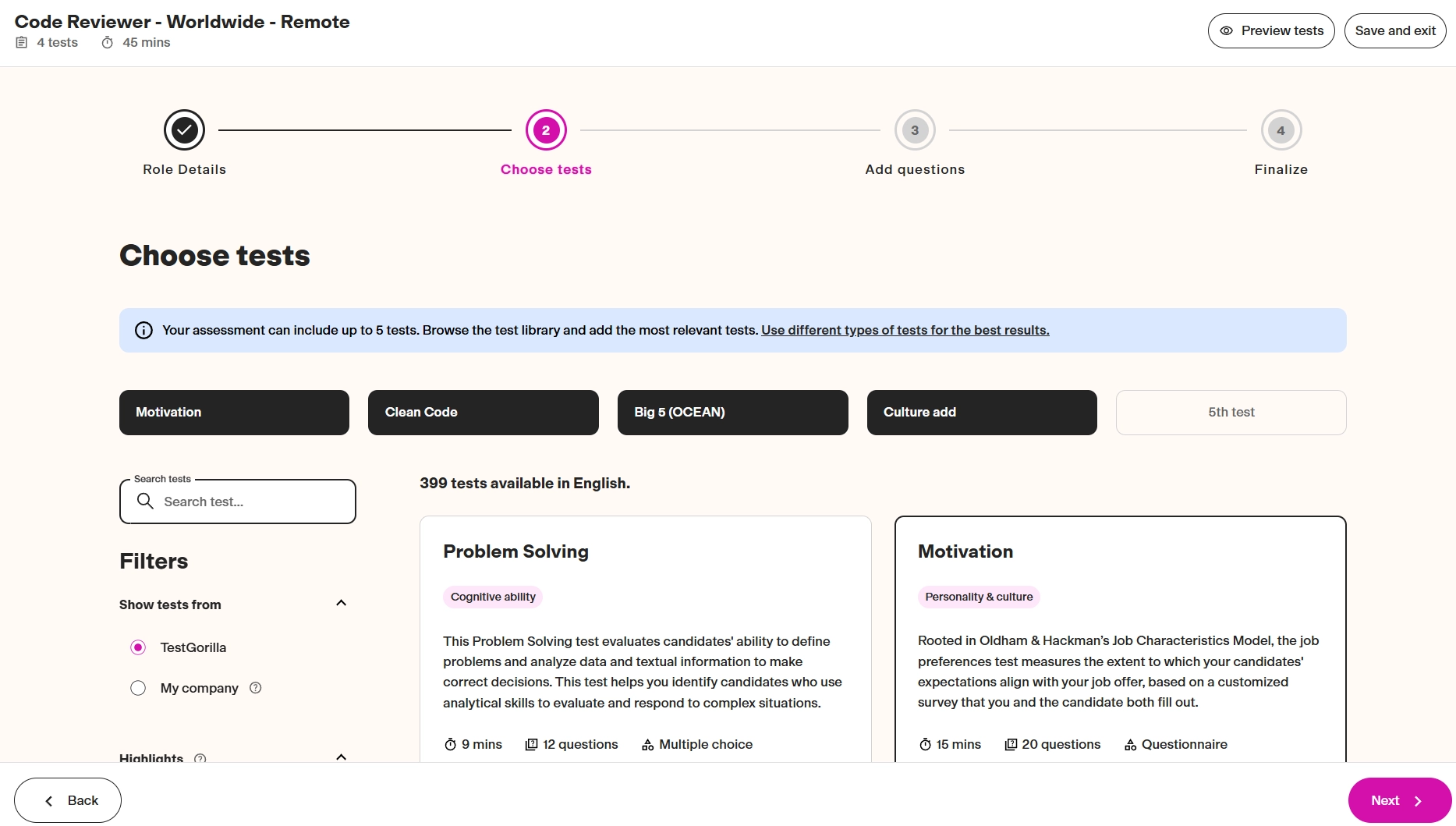Why employment aptitude tests are crucial for screening job applicants (plus the 7 best tests)
Your recruitment tools and practices have a direct impact on your outcomes.
Over-reliance on resumes limits your talent pool and provides insufficient data, which leaves you to base decisions on hunches and end up with mis-hires.
Pre employment aptitude tests solve these problems.
As a candidate screening method, employment aptitude tests accurately predict role performance regardless of the applicants’ backgrounds – reducing bias, widening your talent pool, and ensuring you always make the right hire.
But what are aptitude tests, and which platform has the best online ones? Let’s take a look
Table of contents
- What is an employment aptitude test?
- What are the different types of aptitude tests for employment?
- Why is it important to use aptitude assessments?
- 7 best online aptitude tests for employment
- How should you use employee aptitude tests in your recruitment process?
- How can you help your candidates prepare for your employment aptitude tests?
- Use employment aptitude tests to hire experts for every position
- Employment aptitude test FAQs
What is an employment aptitude test?
An employment aptitude test is a tool employers use to fairly and objectively evaluate candidates’ hard and soft skill sets, personality traits, talents, values, and competencies required for a role.
Employment aptitude tests are also distinct from career assessments, which help individuals explore the best career options according to their skills. Recruiters use aptitude evaluations to eliminate resumes and hire more effectively.
Data from The State of Skills-Based Hiring 2025 shows that 91% of employers who use multi-measure testing make quality hires every time. This is compared to 67% for employers who don't use skills tests. In short, using a combination of pre-employment tests is the best way to predict job success and hire top candidates.
What are the different types of aptitude tests for employment?
Below, we explain the five major types of pre-employment aptitude tests and their place in the candidate screening process.
1. Role-specific skills tests
Role-specific evaluations are indispensable in any talent screening process because they ensure candidates have the practical abilities to excel in a role, from coding and writing to project management.
They gauge candidates’ technical aptitude, industry knowledge, proficiency with specific software, and other specialized skills.
TestGorilla’s Microsoft SQL Server and SQLite Online Skills tests are two good examples. The former evaluates a candidate’s in-depth knowledge of Microsoft SQL Server.
The latter test assesses low-complexity database manipulation skills for junior backend developer screening with questions like the following:
2. Reasoning tests
Reasoning assessments measure how well candidates evaluate and interpret information. There are a couple of different types:
Numerical reasoning measures applicants’ ability to identify patterns in numbers, work with charts and graphs, and correctly interpret simple mathematical data.
Mechanical reasoning tests evaluate how well candidates understand basic mechanical concepts, such as velocity and pulleys.
Spatial reasoning determines whether individuals can analyze 2-D and 3-D objects. This evaluation is ideal for assessing candidates for science, technology, engineering, and mathematics (STEM) positions.
Reading comprehension tests an individual’s ability to draw conclusions from written passages and identify key information in the text. It’s useful for any role that involves research and analysis.
Verbal reasoning determines whether candidates can interpret written data and draw logical conclusions from what they read. The assessments use questions like the one below from our Verbal Reasoning test:
3. Situational judgment tests
Decision-making and problem-solving are the two main types of situational judgment evaluations.
Decision-making assessments evaluate how effectively applicants analyze information to make the best choice among multiple options.
Problem-solving tests, meanwhile, assess candidates’ ability to interpret data, apply logic, organize information according to a set of rules, and respond appropriately to complex situations. They use realistic scenarios like the one pictured in TestGorilla’s example below to identify good problem solvers:
4. Personality tests
Being a good team member or leader takes more than technical skills. Hiring someone with unsuitable personality traits for the role negatively affects others in the workplace, but you can only see this side of your applicants if you evaluate their personality beforehand.
Addressing personality-related needs is also useful down the line because it encourages:
Enhanced company productivity by bringing out the best in employees
Improved wellbeing by accommodating personality differences
Better understanding between managers and their team members
Greater workplace diversity by selecting candidates with suitable traits
Scotiabank is a great example of a company that significantly improved workplace diversity by replacing resumes with personality tests. As a result, the share of Scotiabank’s new Black employees rose to 6% from 1%, and more than 50% of its hires are women.
While not always included in assessments, personality tests send candidates on an introspective journey showing how they react in different scenarios and fit within your team.
The preview below from TestGorilla’s Big Five (OCEAN) Personality test is an example of a standard personality evaluation question where candidates rate how accurately a sentence describes them.
Other personality evaluations include the Enneagram, DISC, and 16 Personality Types tests. Each test uses a different methodology.
Note: Pre-employment or career personality tests should never be the sole basis of your hiring decision-making. Many of them are meant to be a tool to better understand people, and they’re only useful in combination with other assessments.
Switch to skills-based hiring with TestGorilla
TestGorilla makes screening easy and effective. Get started for free with our Big 5 personality test and four other complimentary skills tests.
5. Values tests
Each employee shapes your company culture, so the Culture Add test or an equivalent should be a recruitment staple to evaluate a candidate’s values.
You should look for a culture add rather than a culture fit for each hire. Here’s the difference:
Culture fit is a bias-riddled assessment of a candidate’s similarity to existing employees in terms of hobbies, interests, and career explorations. It’s all about how you “click” in the interview, which leads to a stagnant or insufficient work environment.
Culture add measures the candidate’s closeness to core organizational values and ability to positively contribute to the company.
According to SHRM, companies identify successful applicants when their measures are objective, and their criteria are linked to specific skills, abilities, values, and motivators of candidates.
A Culture Add test quantifies your values to assess and objectively compare applicants’ test results against company benchmarks. You set your custom benchmarks by answering questions like these:
Including this element in your aptitude test ensures your company gains the person it needs, even if, at first, it seems like an unusual career match.
The best insights on HR and recruitment, delivered to your inbox.
Biweekly updates. No spam. Unsubscribe any time.
Why is it important to use aptitude assessments?
We already mentioned that screening with aptitude assessments gives the best results, but what are the benefits of picking the right online aptitude test for a job? Let’s go over them below:
Benefit | Description |
Save time on screening and interviewing | You save time by instantly giving all of your applicants the same assessment instead of poring over hundreds of resumes only to gain incomplete candidate data. |
Measure skills accurately even if you don’t have equivalent knowledge in-house | The best employment aptitude tests are created by subject-matter experts who vouch for their validity. You can rely on them to thoroughly and accurately evaluate candidates’ abilities. |
Evaluate culture add | Good screening platforms offer a culture add or similar evaluation to help you predict how candidates contribute to your culture. Culture add matters because even a highly specialized professional can fail because of a cultural mismatch. |
Make better, more objective hiring decisions | Limit bias, fairly and easily compare results, and hire the best addition to your company instead of picking a confident interviewer who could be a poor fit or disqualifying a great candidate because of a resume gap. |
Reduce turnover and your expenses | Employee aptitude tests increase the chances of hiring candidates who fit the role, reducing turnover rates and the high costs of finding someone new. |
7 best online aptitude tests for employment
These are the best employment aptitude tests and platforms for candidate screening.
1. TestGorilla
TestGorilla is among the top pre employment aptitude test providers available today. Our test library contains more than 300 tests, all developed by subject matter experts.
Combine up to five individual tests for a bespoke assessment, and add custom questions – including those requiring a video reply – to any test. Most individual tests take around 10 minutes, with full assessments taking less than an hour.
Candidates can complete their assessments on their mobile devices. You then get easy-to-understand reports that automatically compare applicants and display the results.
In addition to testing cognitive ability, you can evaluate job-specific skills, situational judgment, language fluency, culture fit, soft skills, and personality traits, enabling you to create a holistic, multi-measure assessment within a single platform.
Ocean Outdoor UK, a digital out-of-home advertising firm, uses a combination of TestGorilla’s pre-employment aptitude tests and custom questions to evaluate candidates’ competencies. It identifies work ethic, critical thinking skills, attention to detail, and practical ability.
Since switching to TestGorilla, the company has experienced great results, including:
Saving up to 10 hours spent on screening and interviewing per candidate
Overhauling the long recruitment process and improving its candidate experience
Decreasing the rate of unsuccessful hires by around 44%
Transform the way you hire with TestGorilla
TestGorilla makes screening easy and effective. Having every test you need with customization features in one place streamlines your recruitment process and leads you to the best person for the role every time.
2. Truity
Truity has questionnaires for individuals who want to learn more about their skills or find their ideal career recommendations during their job search and for businesses that want to screen candidates.
The platform focuses on personality tests, including the Myers-Briggs test, DISC, Big Five, and the Enneagram. They also offer free career aptitude tests and career interest evaluations based on an individual’s traits.
3. Criteria Corp
Criteria Corp is a platform offering aptitude tests for employment measuring areas such as problem-solving, critical thinking, attention to detail, and learning ability.
Its mobile-ready products include cognitive tests and evaluations to measure how well candidates maintain, install, operate, and repair machinery. The platform also has a language-independent cognitive assessment for candidates whose first language isn’t English.
4. TalentLens
Developed by Pearson, an educational publisher, TalentLens is an online platform offering employment aptitude tests that are accessible to candidates through their mobile devices.
Tests include cognitive assessments to measure adaptability, critical reasoning, problem-solving, and learning ability. The platform’s personality assessments evaluate work style, behaviors, and motivators, while its language skills assessments examine how fluent candidates are in English, Spanish, French, or Dutch.
5. ThriveMap
ThriveMap is an online aptitude test provider specializing in high-volume hiring environments, such as manufacturing and call centers. Assessments are always based on the industry the candidate is applying for.
ThriveMap creates custom assessments for every role to measure applicants based on what the job entails. The drawback is that developing an examination for an open position can take 4-6 weeks.
6. PI Hire
PI Hire is an online aptitude assessment provider on The Predictive Index platform. Companies create a behavioral target for each position, listing the personality traits best suited for that role.
The examinations then evaluate each applicant based on this target, visually displaying which job-seekers are a match. You screen for traits such as collaboration, patience, and extroversion. However, job-specific skills testing isn’t available.
7. Prevue
Prevue is a platform for companies that want to measure each applicant’s cognitive ability, personality, and motivation. It starts with a job profile that sets benchmarks for the position. Candidates are then invited to the assessments.
On the Prevue dashboard, you can see a visual representation of how close each applicant comes to the benchmark. For example, Prevue shows how each candidate lands on a scale between “highly cooperative” and “very competitive.”
How should you use employee aptitude tests in your recruitment process?
Employee aptitude tests should be the step after the candidates’ application but before the interview.
You should customize tests to the role and the company and cover all factors that determine the potential for success: hard skills, soft skills, cognitive abilities, personality, culture add, and, in some cases, language.
TestGorilla has hundreds of examinations for any role and career path, enabling you to choose up to five as part of your talent assessment, as shown below.
You can take further steps to tailor the assessment to your needs, such as:
Add custom questions using real-life scenarios the role is likely to deal with or coding questions for programming-related roles
Include qualifying questions to filter candidates before the testing stage
Enable special accommodation and anti-cheating settings
Request video answers as a mini-interview to help with filtering
Take full advantage of these features to get well-suited talent through the interview stage, but don’t discard the candidates that don’t advance to the open position.
Thank them for their time, and keep those with potential in the talent pool for potential careers to feed your proactive recruitment strategy.
Get the most out of skills-based recruiting with TestGorilla
Implementing talent assessments is easy using TestGorilla’s predeveloped test library with evaluations for any role. No more “gut feeling” hiring and expensive mis-hires. Sign up for a live demo to see how it works.
How can you help your candidates prepare for your employment aptitude tests?
It all comes down to communication with candidates. Explaining your process goes a long way to help them prepare for the online aptitude testing and start a relationship on a good note. Here are some suggestions to get you started:
Point to communicate | Description |
Outline what steps are in the hiring process | Manage expectations as soon as you review their application and keep the candidate’s experience front of mind. Research shows that 52% of job seekers have declined an offer because of poor candidate experience. |
Provide information about the employment aptitude tests | Explain what the tests entail to ease anxiety and help candidates show up as their best selves. Show them a preview or example with a short note on how that helps you predict a good role match. |
Inform them about the possible accommodations before testing begins | Timely tell candidates they can ask for special accommodations if they are non-fluent English speakers or have a disability. |
It’s also a good idea to communicate that the screening process evaluates applicants’ suitability for the specific role and company by measuring various aspects, not just their industry expertise.
Therefore, it doesn’t mean they aren’t good enough for the company if they don't make it to the interview. It could be just the wrong type of career or time to work together.
You can still keep in touch and engage for a more suitable role in the future.
Use employment aptitude tests to hire experts for every position
Integrating employment aptitude tests into the hiring process offers clear advantages to your recruitment team and candidates. Remember, the benefits include:
Mitigating unconscious bias in the recruitment process
Saving time during the candidate-sourcing stage
Easily comparing and selecting candidates
Check out our demo to integrate employment aptitude tests into your candidate screening process.
Take a product tour and see how to create your first assessment.
If you’re ready to upgrade your applicant screening process, get started with a Free forever plan today.
Employment aptitude test FAQs
Still have questions about online aptitude assessment tests? Let’s look at the most commonly asked questions about these types of tests.
What is an aptitude test for a job?
An aptitude test for employment is a method of evaluating a candidate’s skills, abilities, beliefs, personality traits, and other aspects to predict potential for success in the role. A combination of online aptitude tests is the most reliable way to screen candidates.
What is usually asked in employment aptitude tests?
Employment aptitude tests typically ask reasoning, situational judgment, personality, culture, and role-related questions based on real scenarios. For example, a pre-employment assessment about critical thinking could ask candidates to pick a logical conclusion based on the provided premises. A coding test could require candidates to choose a strategy for reducing network traffic expenses when a large Javascript file takes up a lot of bandwidth.
The specific questions depend on the type and purpose of the evaluation.
Do aptitude tests really matter?
Business-related scientific research shows that reliable aptitude assessments are valid predictors of job performance. With an aptitude test for employment, you determine how well your prospective candidate performs in the role. The data you gather by examining abilities and traits is much more reliable than what you could gauge from resumes, even when qualifications appear exemplary.
You've scrolled this far
Why not try TestGorilla for free, and see what happens when you put skills first.


